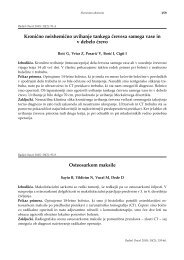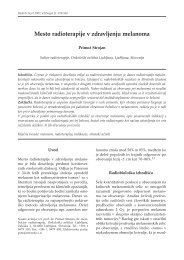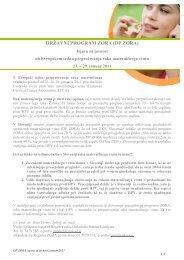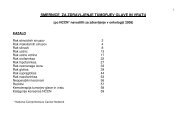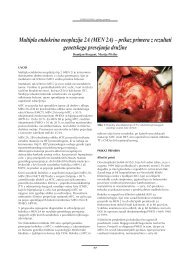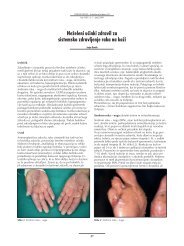You also want an ePaper? Increase the reach of your titles
YUMPU automatically turns print PDFs into web optimized ePapers that Google loves.
Spatiotemporal relevance of tumor cell-derived MMP-9<br />
in liver metastasis by short hairpin RNAi-technology<br />
Michael Gerg 1 , Susanne Schaten 1 , Dylan Edwards 2 , Charlotte Kopitz 1 ,<br />
and Achim Krüger 1<br />
1<br />
Klinikum rechts der Isar der Technischen Universität München, Institut für Experimentelle<br />
Onkologie und Therapieforschung, Ismaninger Str. 22, D-81675 München; 2 School of<br />
Biological Sciences, University of East Anglia, Norwich NR4 7TJ, U.K.<br />
MMP-9 expression correlates with malignancy and poor prognosis for many cancers.<br />
In established tumors or metastases, tumor cells and even more so host cells such as<br />
fibroblasts and macrophages are the source of MMP-9 expression. However, in the<br />
dynamic consecutive events of the different steps of metastasis, the spatiotemporal<br />
relevance of tumor cell-derived MMP-9 is still unclear. We therefore monitored MMP-9<br />
expression during the time-course of experimental liver metastasis in an aggressive<br />
syngeneic murine lacZ-tagged T-cell lymphoma model, which led to formation of<br />
110-130 macrometastatic colonies (>200 µm) and secondary infiltration of single cell<br />
metastases within 7 days after tumor cell inoculation (a.t.c.i.). While the lymphoma<br />
cells did not express MMP-9 in vitro, we detected two peaks of tumor-cell associated<br />
MMP-9 expression, one 3 h a.t.c.i., enabling extravasation and colonization of tumor<br />
cells, the other 6 d a.t.c.i. corresponding with secondary invasion of micrometastases.<br />
Down-regulation of MMP-9 in tumor cells by retroviral transfer of MMP-9-shRNA led<br />
to significant reduction of macrometastases and micrometastatic spread, while both<br />
were augmented by overexpression of MMP-9. Although MMP-9-deprived tumor<br />
cells were found to compensate their gelatinolytic activity by in vivo-induction of<br />
other gelatinolytic proteases (MMP-2, cathepsins and uPA) and even activate scatter<br />
factor-signaling, secondary invasion was still blocked. We conclude that tumor cell-<br />
MMP-9 acts during extravasation and is a crucial pro-metastatic factor for secondary<br />
invasion.<br />
p1081





